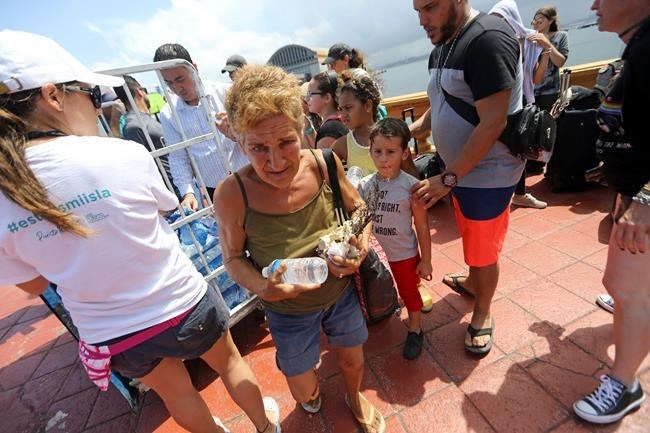
Gale Maldonado carries away water bottles being passed out to people waiting to evacuate Puerto Rico by cruise ship in the aftermath of Hurricane Maria in San Juan, Puerto Rico, Thursday, Sept. 28, 2017. The aftermath of the powerful storm has resulted in a near-total shutdown of the U.S. territory’s economy that could last for weeks and has many people running seriously low on cash and worrying that it will become even harder to survive on this storm-ravaged island. (AP Photo/Gerald Herbert)
September 28, 2017 - 1:47 PM
WASHINGTON - President Donald Trump on Thursday waived a 97-year-old law to allow relief supplies to get through to Puerto Rico in the wake of devastation caused by Hurricane Maria.
The so-called Jones Act, which prohibits foreign-flagged ships from hauling cargo between U.S. ports, was slowing the delivery of aid and driving up costs. A brief explanation of the law:
REBUILDING AMERICAN SHIPPING
During World War I, German U-boats decimated America's merchant fleet. After the war, Congress passed the Merchant Marine Act of 1920 in an effort to rebuild U.S. shipping. Among other things, the law mandated that ships carrying cargo and passengers between U.S. ports must be built in the United States and owned by Americans. The vessels are also required to carry American crews.
The law is known as the Jones Act after sponsor Sen. Wesley Jones of Washington state.
The Jones Act also was meant to ensure that America had a homegrown merchant fleet in case of war. It is strongly supported by some U.S. shipping companies, some national security advocates and organized labour. The Maritimes Trades Department of the AFL-CIO says the law "accounts for hundreds of thousands of American jobs and ... helps pump billions of dollars into the economy."
HIGHER COSTS
But cutting out foreign competition has driven up the cost of carrying cargo between U.S. ports. A 2011 study by the U.S. Transportation Department Maritime Administration found that the daily operating costs ran 2.6 times higher on U.S.-flagged ships compared to those flying foreign flags, largely because the cost of operating a crew was more than 5 times higher.
The prohibitive cost of shipping between ports has warped the U.S. transportation system, argues Daniel Ikenson, director of the libertarian Cato Institute's Center for Trade Policy Studies. If it weren't for the higher costs imposed by the Jones Act restrictions, for instance, it would often make sense to carry Midwestern grain to the East Coast by sea. Instead, the grain is shipped by rail or truck (imposing environmental costs) — or even imported from abroad.
The costs are especially damaging to states and territories, such as Hawaii and Puerto Rico, that are supplied by sea. A 2012 study by the Federal Reserve Bank of New York, assessing Puerto Rico's deep economic troubles, found that it cost $3,063 to ship a container of goods from the U.S. East Coast to Puerto Rico — more than double the cost of shipping the same container to nearby Santo Domingo, Dominican Republic, which isn't covered by the Jones Act.
RETHINKING THE JONES ACT?
Earlier this month, acting Homeland Security Secretary Elaine Duke waived the Jones Act to speed the delivery of fuel to the Southeast after hurricanes Harvey and Irma. For a time, Puerto Rico was covered, too — but the waiver expired just before Maria hit the island, knocking out electricity and leaving residents desperately short of fuel, goods and other supplies. The Trump administration initially said Puerto Rico didn't need another waiver because there were plenty of U.S.-flagged ships to supply the island.
Under pressure to do more, the administration reversed itself Thursday and announced the waiver. Puerto Rican Gov. Ricardo Rossello responded on Twitter to Trump's action: "Thank you @POTUS."
Jones Act opponents hope the crisis will rally opposition to the Jones Act. Arizona Sen. John McCain, who has sponsored legislation to kill the Jones Act, tweeted: "Now Congress must repeal this law to aid long-term recovery."
"If we're taking the noose off Puerto Rico, isn't that a good permanent solution, too?" asks Cato's Ikenson. But when the crisis recedes, "we're going to put the noose back around their neck and tighten it up again?"
News from © The Associated Press, 2017